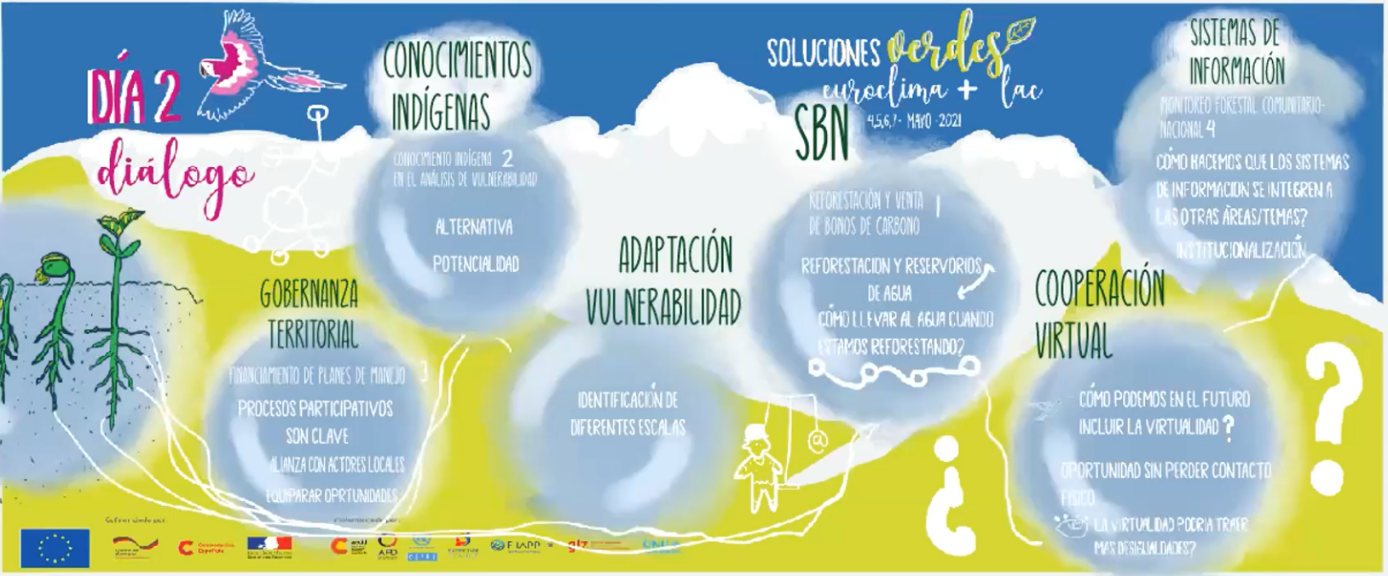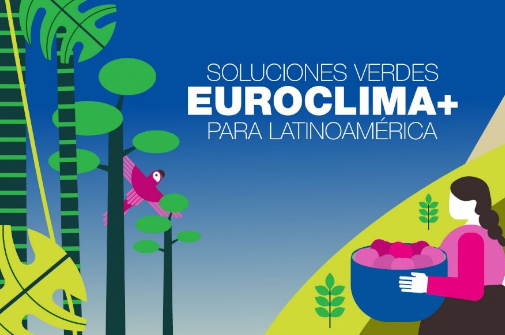EUROCLIMA+: green solutions for Latin America
From 4 to 7 May 2021, 150 participants from 15 countries took part in the virtual regional meeting “Soluciones Verdes EUROCLIMA+ para Latinoamérica” (EUROCLIMA+ Green Solutions for Latin America), organised by Expertise France in partnership with GIZ. The objective was to inform policy makers and partners about the initial green solutions identified by the programme.
These EUROCLIMA+ green solutions are the result of the systematisation of the outcomes, good practices and lessons learnt from projects supported by the EUROCLIMA+ programme in the “Resilient food production” and “Forests, biodiversity and ecosystems” sectors, two components implemented by Expertise France with GIZ. These solutions were selected for their potential for replicability in other contexts and their potential to contribute to the green recovery in Latin American countries.
For further reading: Preserving Forests: A Focus on Innovative Projects Supported by EUROCLIMA+
Capitalising on and using green knowledge
The regional meeting had two objectives: give visibility to this knowledge and create spaces for dialogue to explore the possibilities for reproduction or extension in the public policies of the beneficiary countries of the EUROCLIMA+ programme.
It was an important step towards capitalising on the knowledge generated under the EUROCLIMA+ programme and making it available to the main stakeholders, in particular decision-makers.
Six main themes
The 18 green solutions are divided into 6 main themes:
• Territorial governance: the solutions proposed make it possible to implement broadly participatory, multi-stakeholder and multi-level processes and alliances with territorial stakeholders. These are essential for the implementation of sustainable processes for climate change adaptation and mitigation.
• Adaptation based on the variables of vulnerability: these solutions focus on people who are highly dependent on natural resources and have a limited capacity for climate adaptation. As pointed out by Edurne Battista, from the National Agricultural Technology Institute (INTA) in Argentina, the solutions presented make it possible to identify three levels of action: the family, the municipality and public policies.
• Nature-based solutions: Rebeca Dávila, from the Inter-Church Organisation for Development Cooperation (ICCO), pointed out that there are complementarities between the solutions where the climate situations are similar. They therefore aim to sustainably protect, manage and restore natural or modified ecosystems, providing benefits for human well-being and biodiversity. For example, a solution related to reforestation and carbon storage can draw on lessons learnt from a solution related to water reservoirs.
• Virtual cooperation: these solutions are the result of creativity aiming at adapting to new forms of work through virtual cooperation, which have been accelerated by the pandemic, while avoiding creating a technological divide between the beneficiaries. According to Marcello Rachetti, from the National Commission for Rural development (CNFR) in Uruguay, “We cannot lose contact, especially in field activities with the families of farmers and producers”.
• Information systems: Marlen Espinoza (Helvetas, Honduras) feels that it is important to legitimise and disseminate the use of information systems with a view to the Nationally Determined Contributions (NDCs) to the 2015 Paris Agreement. Information systems make it possible to pool data, including different types of meteorological, geographical and socioeconomic data from various sources in order to generate better quality information. In addition, the integration of technology into traditional systems increases transparency and facilitates decision-making for stakeholders from the local to the national level.
• Indigenous knowledge: the solutions proposed reflect the cosmovisions of indigenous peoples and promote policies for their long-term rights. The potential of indigenous knowledge is unquestionable, says Ramiro Batzin (Sotz'il, Guatemala): “I’ve been through all the ‘thematic rooms’ [of solutions] and they are always present. It’s a cross-cutting issue”.
The green solutions are available in two different formats: infographics summarising the main components of the solution and a more detailed long format.

“Our projects must not be isolated”
The importance of sharing between countries and continuing exchanges was noted by the participants at the meeting. For Oscar Rojas, from Fondo de Manejo de Páramos y Lucha contra la Pobreza Tungurahua (FMPLPT) in Ecuador, the “Soluciones Verdes EUROCLIMA+ para Latinoamérica” regional meeting has shown that “each solution gives a message of hope for our territories and shows that citizen participation is the key to success”. Iris Barth, from INTA, points out the extent to which Latin American countries face similar issues, for which the solutions presented are interesting due to the responses they provide, as well as the methodology that has underpinned their systematisation, “a simple and direct model”.
Gustavo Solano, from the Association for Research and Integral Development (AIDER) in Costa Rica, says “Our projects must not be isolated, we must build networks”. Cross-cutting discussion groups were set up during the meeting for this purpose. The discussions were systematised based on eight action plans that focus on the collaboration and communication flows between stakeholders and sectors and, ultimately, the importance of networking. The stakeholders of the 18 solutions currently share several communication channels, including a forum which has been open since the first day of the event.
These projects supported by EUROCLIMA+ will continue the efforts to systematise good practices and the lessons learnt in the coming months, which should give rise to a new wave of EUROCLIMA+ green solutions. Expertise France, which is responsible for the technical assistance in the “Resilient food production” sector, is providing close support to this process. A series of publications is planned by the end of 2021.
 For further information...
For further information...
• The EUROCLIMA+ Resilient Food Production sector
• The project solution sheet “Resiliencia Andina: fortaleciendo la producción agropecuaria de pequeña escala en zonas vulnerables al cambio climático en la sierra de Ecuador y Perú” (in Spanish)
• The project solution sheet “Paisajes cafetaleros resilientes al cambio climático en el corredor seco” (in Spanish)
For further information: alimentos.comunicacion@euroclima.org
 Find out more about EUROCLIMA+: www.euroclimaplus.org
Find out more about EUROCLIMA+: www.euroclimaplus.org



